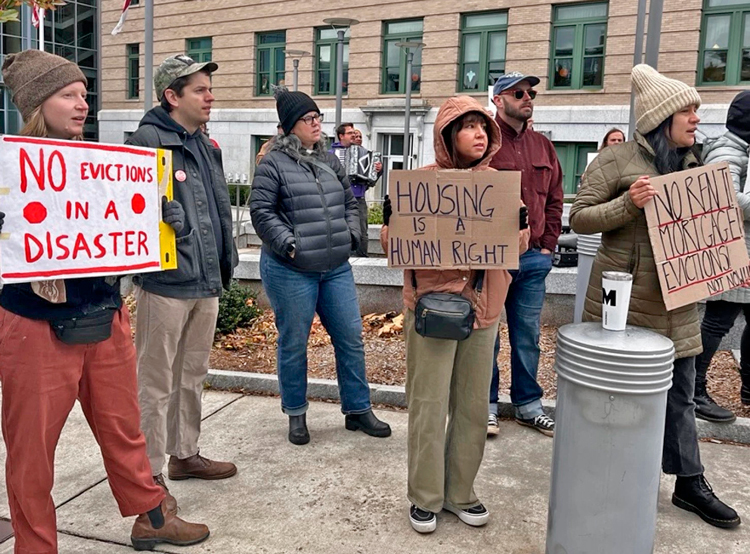It’s been over two months since Hurricane Helene devastated Asheville, North Carolina, and other nearby towns and rural areas. While the flood waters have receded, the social and economic catastrophe wrought by the storm continues to weigh on the lives of working people. This includes a wave of evictions pressed by profit-hungry landlords.
The storm killed over 225 people across six states, with the biggest toll in western North Carolina. Over 100,000 homes were damaged or destroyed. But many people were obligated to keep paying rent on homes or apartments that still stood, even though they couldn’t live in them because of damage and no power or running water. And many ran out of money amid long-term joblessness, as businesses, stores, restaurants and farms closed for weeks into months.
While hundreds of volunteers responded to the crisis, offering help and expertise to clean up and organize food and other aid, they couldn’t solve some deeper problems.
For nearly two months it was unsafe to drink from Asheville’s heavily damaged water system. The city finally lifted its boil water notice Nov. 18, though residents have still been advised to flush their pipes daily to avoid lead contamination.
Since the courts in Buncombe County, which includes Asheville, reopened in mid-October, at least 225 new eviction cases have been filed there, the North Carolina Tenants Union reported. And filings have accelerated as more people missed November rent deadlines.
Those most deeply affected are workers “who are the backbone of the service economy here, some who haven’t been paid for two months,” Marcia Mount Shoop, a pastor at the Grace Covenant Presbyterian Church in Asheville, told the Militant in a phone interview Dec. 7. She helps lead the relief center at the church, which has worked to raise and provide supplies and funds for those facing evictions.
“The majority of people coming for support are monolingual Spanish speakers. They work in restaurants, hospitals, clean hotel rooms. Some are in landscaping, many are agricultural workers, where some of their workplaces were just washed away,” she said. “Some are construction workers, who have not worked at all, and some who are now back at work, getting just two days a week.”
Rents were high in Asheville and the surrounding area before the storm, with half of renters in Buncombe County paying at least a third of their income on housing. With the huge numbers of damaged and uninhabitable housing today, profit-gouging landlords have been taking advantage of this situation to raise rents even higher.
“While it is never an ideal situation, sometimes tenant eviction is a must to keep your rental business healthy and profitable,” Asheville Phoenix Properties says on its web page. It’s the leading real estate management company in the city. In North Carolina, tenants can be evicted within as little as three weeks if the owner or realtor gets a court order for the Sheriff’s Office to do so.
‘Scale of this is unfathomable’
“Every single day we serve about 100 people at the church’s relief site, and every single day we see new people coming in with eviction letters,” said Mount Shoop. “The scope and scale of this is unfathomable. We’re paying landlords. It’s not like giving cash to tenants. We need more time to get through all the requests, there are so many!”
The church has given out $1.5 million in rent support in the last two months, she said. “Most comes from private donations from people all over the world.”
For thousands who have lost their homes, little to nothing is being done by government authorities to provide assistance. Blue Ridge Public Radio reported that through early December only 14 families in western North Carolina received a mobile home or trailer from the Federal Emergency Management Agency to use as temporary housing.
It’s working people pitching in that makes a difference, Mount Shoop said. “They come from all over the community and from out of town,” and make donations, both large and small. “One person came and got rent support and handed us $3, saying he wanted to help somehow.”
At the end of November, the city of Asheville and Buncombe County collectively approved grants of $500,000 for Grace Covenant’s rental assistance program. “But this will be gone in 10 days!” she said.
Those who lost jobs because of business closures can apply for disaster unemployment assistance, but the maximum weekly payment in North Carolina is $600, which doesn’t come close to covering rent payments as well as other necessities, like food and gas.
Hundreds of people signed an open letter Nov. 18 calling for an eviction moratorium. In North Carolina, such an order can only come from the governor, the general assembly or the state Supreme Court. The state legislature in October approved a measly $1 million for rental, mortgage and utility assistance for all the areas hardest hit by Helene.
Some workers have managed to get their hands on yurts to set up for shelter. These are the primary form of housing for nomadic peoples in Mongolia — large, fortified circular tents, with room for a wood-burning stove to cook on that also works as a heater, and provides extra insulation and space.
“They’re not camping out. That’s their home,” Brenda Lunsford told BPR News, standing by the yurt she set up in her backyard. She estimates she would need about $100,000 to repair the storm damage to her house. “We’ve been helping each other get wood. And we’ve got to help each other in this world.”


